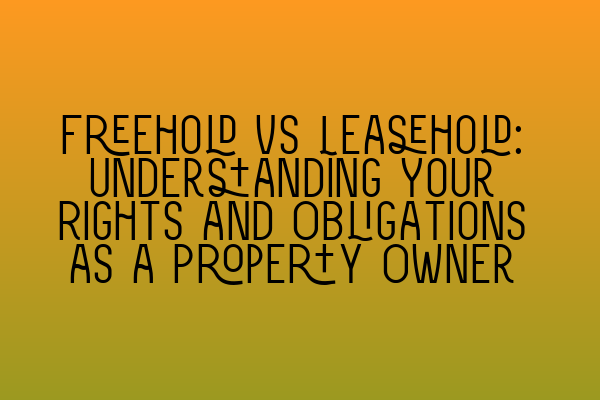Freehold vs Leasehold: Understanding Your Rights and Obligations as a Property Owner
As a property owner, it is essential to understand the difference between freehold and leasehold. These terms refer to the type of ownership you have over your property and come with specific rights and obligations. This knowledge will help you make informed decisions about buying, selling, and managing your property. In this blog post, we will delve into the nuances of freehold and leasehold, explaining their characteristics and implications.
Freehold Ownership:
Let’s start with freehold ownership. When you own a property freehold, you have complete ownership and control over the land and buildings on it. This means you have the right to occupy the property indefinitely and can use it as you see fit, as long as it abides by local planning and zoning laws. Freehold ownership is the most straightforward and unrestricted form of property ownership.
With freehold ownership, you also have the advantage of owning the land beneath the property. You are responsible for the maintenance and repair of all aspects of the property, including the structure, utilities, and any outdoor spaces. You have the freedom to make alterations or improvements to the property without seeking permission from anyone unless there are specific restrictions in place.
Leasehold Ownership:
On the other hand, leasehold ownership involves a different set of rights and obligations. When you own a property leasehold, you have a contract or lease with the freeholder, also known as the landlord, which grants you the right to occupy the property for a fixed period. Most leasehold agreements are long-term, typically lasting between 99 to 999 years.
Under a leasehold arrangement, you have the right to use and enjoy the property during the lease term. However, you must adhere to the terms and conditions stipulated in the lease. These conditions can vary and may include restrictions on making alterations to the property without consent, paying ground rent, service charges, and following certain rules imposed by the freeholder or a managing agent.
Leasehold properties are commonly found in shared buildings or complexes, such as apartments, townhouses, or commercial spaces. In these cases, the freeholder or management company is responsible for maintaining and managing the overall building or shared areas. As the leaseholder, you may be required to contribute to the cost of these services through service charges.
Lease Renewal and Extension:
If you own a leasehold property, it’s important to be aware of the lease term remaining. As the lease term decreases, the value of the property may also be affected. However, most leasehold properties give you the right to extend or renew the lease. It’s advisable to consult a property solicitor who specializes in leasehold matters to guide you through the process and protect your rights.
Lease extensions can be complex, involving negotiations and potentially payment of additional premiums. However, extending the lease can add value to your property and provide you with security and peace of mind in the long run. It’s worth noting that leasehold extension rights may differ depending on whether you own a residential or commercial property.
Understanding Your Rights and Obligations:
Whether you own a freehold or leasehold property, it’s crucial to familiarize yourself with your rights and obligations as a property owner. This knowledge will empower you to make informed decisions about your property and avoid potential disputes or legal issues in the future.
As a freeholder, you have the freedom to do as you wish with your property, but it’s essential to comply with local regulations and obtain planning permission when required. Regular maintenance and safeguarding the condition of your property are also important to protect its value.
Leaseholders, on the other hand, must abide by the terms set out in the lease agreement. This includes paying ground rent and service charges promptly and adhering to any restrictions or rules specified. It’s advisable to review the lease carefully before purchasing a leasehold property to ensure you understand your rights and responsibilities fully.
Seeking Legal Advice:
Property ownership can be complex, particularly when it comes to leasehold properties. If you are unsure about your rights and obligations or require assistance with lease extensions, leasehold enfranchisement, or any other property-related matter, consulting a property solicitor with expertise in property law and land law is highly recommended. They can provide invaluable guidance and ensure your interests are protected throughout the process.
At SQE Property Law & Land Law, our team of experienced solicitors specializes in property law matters. If you require legal advice or representation, please do not hesitate to contact us. Our expert solicitors are dedicated to providing exceptional service and finding the best solutions for our clients.
In conclusion, understanding the differences between freehold and leasehold ownership is crucial when it comes to being a property owner. Whether you own a freehold or leasehold property, knowing your rights and obligations will empower you to make informed decisions and navigate any challenges that may arise. If you have questions or need legal assistance, don’t hesitate to reach out to SQE Property Law & Land Law for professional guidance and support.
Related Articles:
– SQE 1 Practice Exam Questions
– SQE 1 Practice Mocks FLK1 FLK2
– SQE 2 Preparation Courses
– SQE 1 Preparation Courses
– SRA SQE Exam Dates
